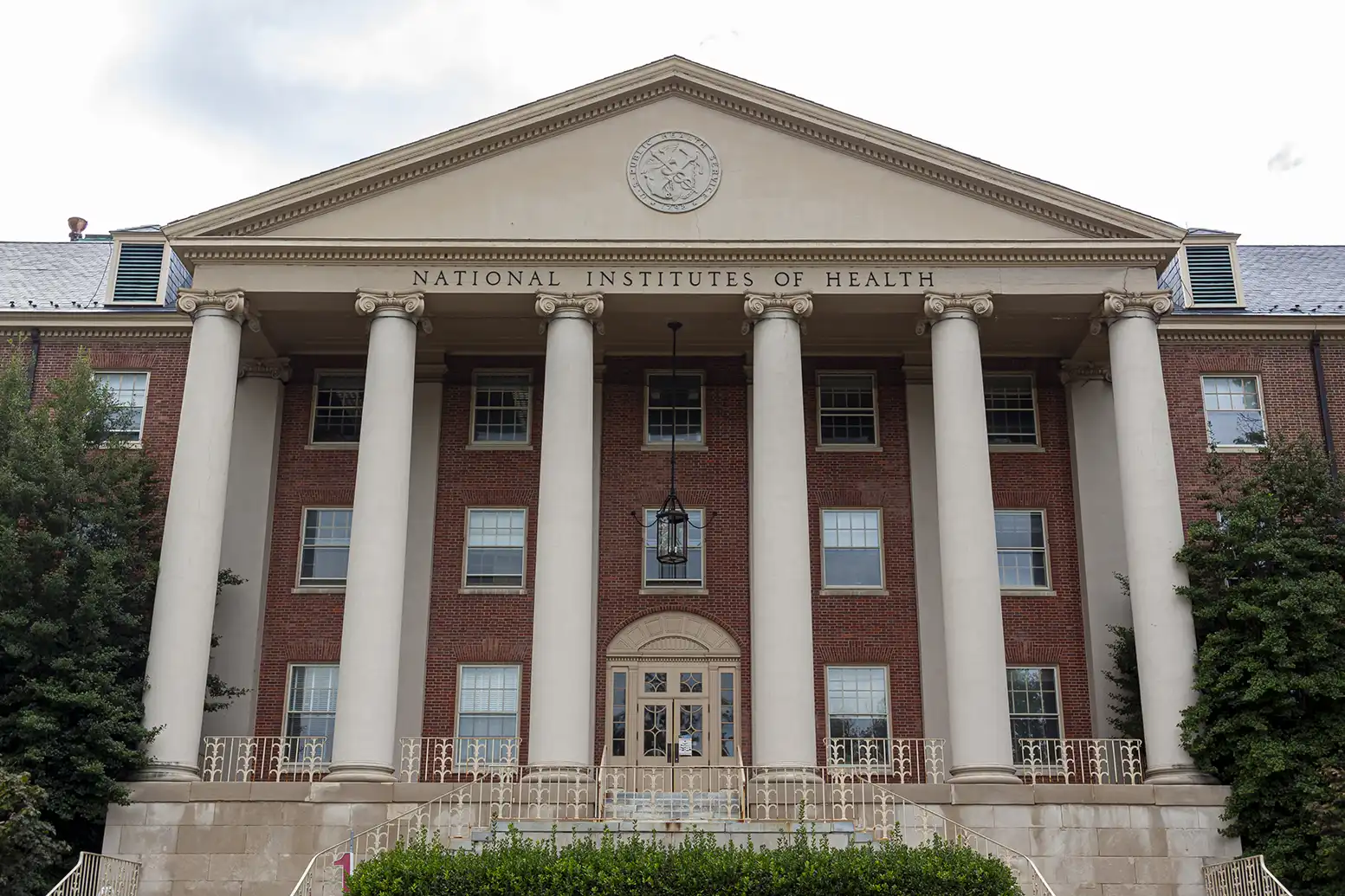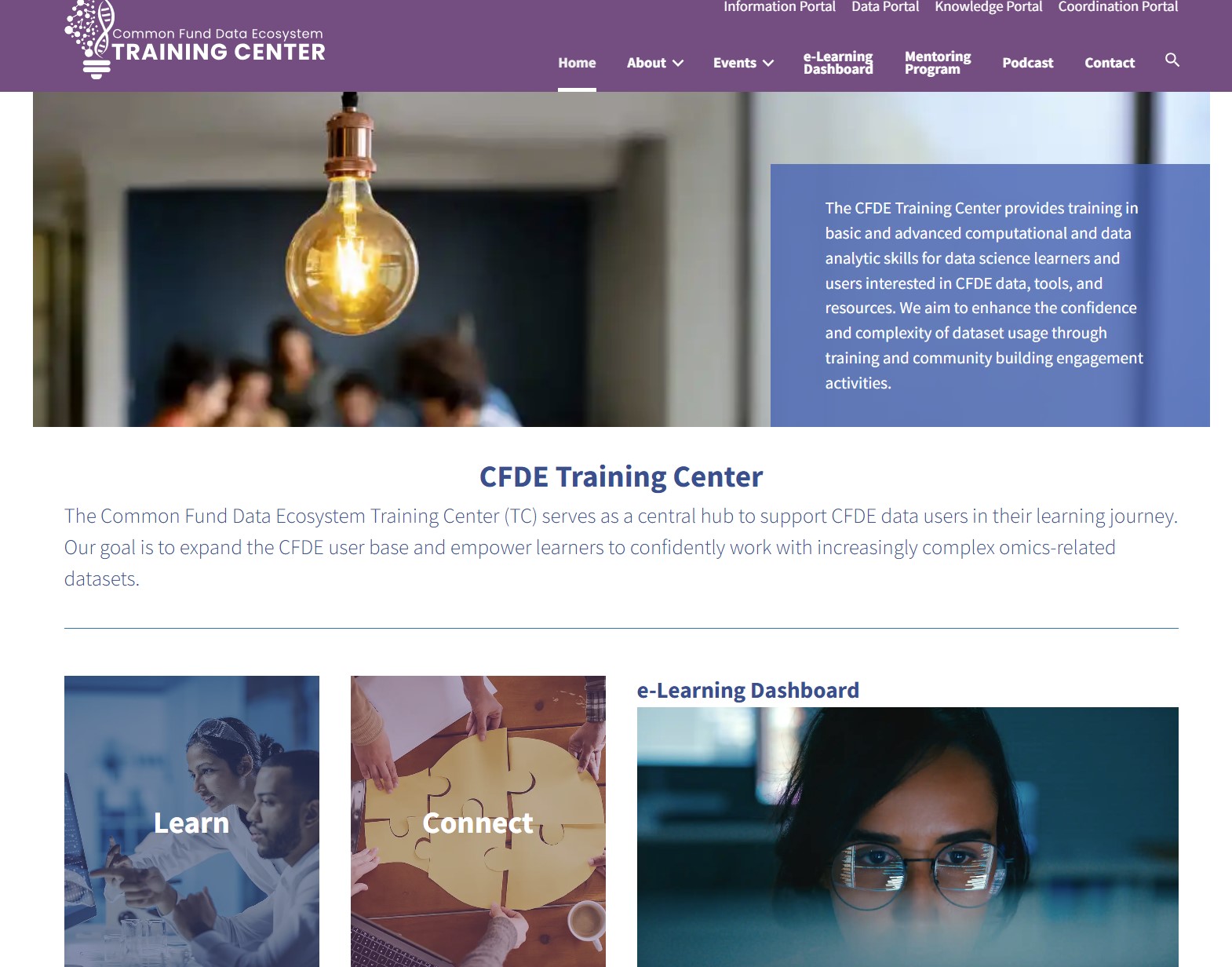ORAU is helping researchers working with genomics, proteomics, clinical data and structural data accelerate discoveries by training them to use the National Institutes of Health (NIH) Common Fund Data Ecosystem (CFDE). ORAU won an NIH contract to create a state-of-the-art virtual training center for this very purpose.
What is the CFDE?
NIH Common Fund programs generate datasets from a variety of projects ranging from genomics to phenotypes. The CFDE aims to facilitate improved discovery, reuse, integration and analyses of these datasets to form novel hypotheses for accelerating discoveries in biomedical research. The CFDE is organized around five Centers that integrate data, resources and knowledge from many Common Fund Programs. The resources created by the Centers empower the research community to use Common Fund data sets for novel scientific research that was impossible before.

ORAU is working with the National Institutes of Health Common Fund Data Ecosystem to enhance access, usability and integration of diverse biomedical research data to accelerate scientific discovery and innovation.
“The Common Fund Data Ecosystem has a little over 20 different programs and projects, and they're all focused around different biological questions or diseases, like GTEx, Kids First, SPARC, MoTrPAC,” said Allissa Dillman, Ph.D., co-principal investigator and owner of BioData Sage LLC. Dillman is a partner with ORAU in developing and managing the CFDE Training Center.
“These programs are now anchored around these five interconnected centers, which are really meant to help build meaningful connections throughout these CFDE programs,” she said. “So, there's the Data Resource Center, the Cloud Workspace Implementation Center, the Training Center, the Knowledge Center, and the Integration and Coordination Center.”
Why is the CFDE Training Center important?
The Training Center (TC) serves as a central hub to support current and prospective CFDE users in their learning journey. Working collaboratively with other Centers, funded programs, and projects, the TC addresses training needs while promoting community engagement. Its goal is to expand the CFDE user base and empower users to confidently work with increasingly complex datasets.
“What's neat about the CFDE is that it brings all these high-impact, diverse data sets into one place and actually helps unlock their full potential together,” Dillman said.
Bringing these disparate data sets under one roof makes all data more findable, accessible, interoperable, and more reusable or fair, Dillman said. The CFDE removes barriers among all these data sets that were not necessarily designed to connect with each other.
Jennifer Burnette, ORAU project manager and Director for the CFDE Training Center, adds that the CFDE allows datasets to be mined beyond their original project dates, which benefits both the original project and current and future researchers.
“This ecosystem is really important and useful for people because you can see these very long-standing data resources that you can trust will be available for you as you're working through your research and the things that you want to do,” Burnette said.

ORAU offers a CFDE Training Center to enhance dataset usage.
What does the CFDE Training Center offer researchers?
Because the Training Center’s goal is to train current and new researchers to use the CFDE, several resources and programs have been created to achieve that goal. These resources include:
- E-learning Dashboard: A virtual community of learners supported through an e-learning platform where participants can access trainings and engage in continuing education efforts. Visit cfde-trainingcenter.reach360.com to learn more about our recent foundational How-To seminar series, which defines omics-related research areas in the context of available CFDE data.
- Integrated Mentoring Program: This unique mentoring program approach aims to increase interdisciplinary collaboration and meaningful use of CFDE datasets. To achieve this goal, the mentoring program supports the professional development of faculty-student dyads, who are current or new CF data users and pairs them with mentors from CFDE Data Coordinating Centers.
- Hackathons and Workshops: The TC teaches data skills and promotes CFDE data and tools by hosting hackathons and workshops to ensure a high-quality and hands-on learning experience for the research community. Team projects from our 2025 Hackathon at the Bio-IT World conference can be accessed at https://bit.ly/BioITHack2025repos.
- Decoding the Data Ecosystem Podcast: The TC hosts a podcast featuring engaging conversations with a broad range of experts, exploring emerging concepts and topics in omics-related research in the context of available CFDE data and resources and how they relate to researchers. Visit https://blubrry.com/3847772/ or search “Decoding the Data Ecosystem” on your favorite podcast platform.
- Engagement and Outreach: The TC engages in virtual and in-person education and engagement in collaboration with academic institutions and other partnerships within and outside the CFDE network, including conferences, seminars, dialogue calls, and more.
“Our philosophy for the CFDE Training Center is based around three core components: remember, understand and apply,” Burnette said. “Anything we're doing with the training center, whether it's events or hackathons or mentor program, we're always trying to hit at least two of those things. We want you to ideally remember, understand, and apply what you've learned.
“We consistently work to implement that strategy in anything that we're doing and help us really stay within the scope of what we're trying to accomplish, while also supporting all the other centers available within CFDE and the broader ecosystem itself,” Burnette said.
Researchers who remember, understand and apply what they learn in the CFDE training center will be able to mine the vast array of data available in the NIH Common Fund Data Ecosystem, which will accelerate knowledge and discovery and make the world a better place for all of us.
Questions about the CFDE Training Center? Contact cfde-trainingcenter@orau.org.